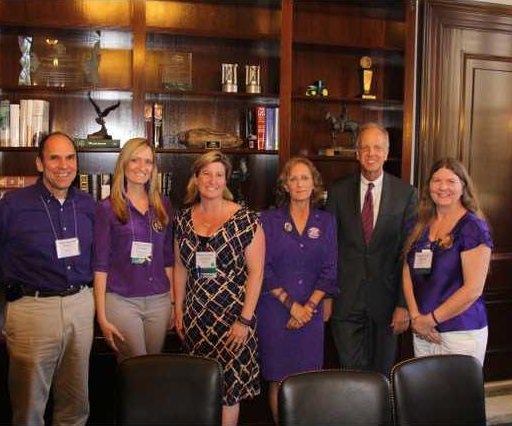September is Baby Safety Month, and Safe Kids Kansas reminds parents and caregivers to plan ahead to make safe spaces for babies “at home, at play and on the way.”
Safe Kids Kansas director Cherie Sage has the following basic safety tips for children ages zero to three:
In the nursery:
Remove pillows, soft bedding such as blankets or bumper guards and toys out of your baby’s crib. Make sure a soda can cannot fit between the crib slats. Make sure the crib’s corner posts are the same height as the end panels. The mattress should fit snugly inside the bed frame without gaps. Keep beds, cribs and other furniture away from windows so kids can’t climb up. Window screens are meant to keep things out, not in. Infants should always be placed to sleep on their backs (face up). For more information on safe sleep visit www.safesleepkansas.org .
Note: Unaccustomed sleep position is also an issue. The American Academy of Pediatrics (AAP) states parents and child-care providers need to be aware that infants who are normally placed to sleep on their backs, who are then placed on their stomachs to sleep, are as much as 18 times more likely to die from Sudden Infant Death Sydrome (SIDS). Infants who are regularly placed to sleep on their stomachs have a five times greater risk of dying of SIDS than children who are placed to sleep on their backs. Talk to everyone who provides care to your infant, and make it a rule they should always be placed on their back to sleep. This important conversation needs to take place before the child is cared for by a relative, baby sitter or child-care provider and should be reinforced by both the parent and other providers on a regular basis.
In the kitchen:
Never leave a hot stove unattended. Cook with pots and pans on back burners. Turn pot handles to the back of the stove. Keep hot liquids, poisons, lighters, matches and electrical cords out of reach. Don’t let children under age three eat small, round or hard foods such as hot dogs, grapes, hard candy, nuts or popcorn.
In the bath:
Mix hot and cold water together, and test the temperature before putting the baby in. Set your hot water heater to 120 degrees to help prevent scalding. Never leave a baby alone in the bath.
In the water: Never leave your baby unattended in or near water, even for a second. Empty and turn over all buckets and wading pools as soon as you are done using them. Pools should be fenced on all four sides and have self-closing gates.
In the play room:
Do not use baby walkers. Use stationary play centers instead. Look for well-made toys and follow the age and safety information on the warning labels. Check regularly for dangers such as sharp edges. Keep toys with small parts or other choking hazards away from children under age three. Avoid toys that can become hazards. Toys with strings, straps or cords longer than seven inches can accidentally strangle children. Electrical toys are a potential burn hazard. Children under age eight should not use toys with electrical plugs or batteries. Make sure toys are stored safely. Choose toy chests with hydraulic lids to prevent entrapment, or remove the lid. Also, make sure toy chests have ventilation holes, to prevent suffocation in case a child becomes trapped inside.
In the home:
Install guards on windows that you will open, and tie up cords on curtains and blinds to prevent strangulation. Install smoke alarms and carbon monoxide detectors on every floor and outside all sleeping areas. Install safety gates at top and bottom of stairs. Always strap babies into high chairs, swings, changing tables and strollers. Keep cleaning products, medicines and other poisons locked and out of reach. Keep the poison control hotline number (800-222-1222) and emergency numbers by every phone and programmed into cell phones.
In the car:
All children ages 13 and under should be properly restrained in a back seat on every ride. Choose and use correctly the right restraint for your child. Infants should ride in rear-facing car seats as long as possible, until they are at least one year old and weigh at least 20 pounds. Keep children rear-facing to 30-35 pounds if your car seat allows it. Children who are at least one year old, weigh 20 to 40 pounds, and can no longer ride rear-facing should ride in forward-facing car seats secured with harnesses. Always check the harness for proper fit according to the car seat manufacturer.
Baby Safety Month is an annual observance led by the Juvenile Products Manufacturers Association since 1991. For more information about Baby Safety Month, visit http://www.jpma.org. For more information about Child Passenger Safety, visit www.usa.safekids.org .
Safe Kids Kansas, Inc. is a nonprofit Coalition of over 70 statewide organizations and businesses dedicated to preventing accidental injuries to Kansas children ages 0-14. Local coalitions and chapters cover Allen, Anderson, Atchison, Butler, Clay, Coffey, Dickinson, Doniphan, Douglas, Elk, Ellis, Finney, Geary, Harvey, Jackson, Jefferson, Johnson, Labette, Leavenworth, Marion, Marshall, McPherson, Meade, Mitchell, Montgomery, Pottawatomie, Riley, Saline, Sedgwick, Shawnee, Smith, Sumner, and Wilson counties, as well as the city of Emporia and the Metro Kansas City Area (Wyandotte county and several Missouri counties.) Safe Kids Kansas a member of Safe Kids Worldwide, a global network of organizations whose mission is to prevent accidental childhood injury. The lead agency for Safe Kids Kansas is the Kansas Department of Health and Environment.
Visit it at www.safekidskansas.org and on Facebook.
September is Baby Safety Month
Safe Kids Kansas offers baby safety tips





